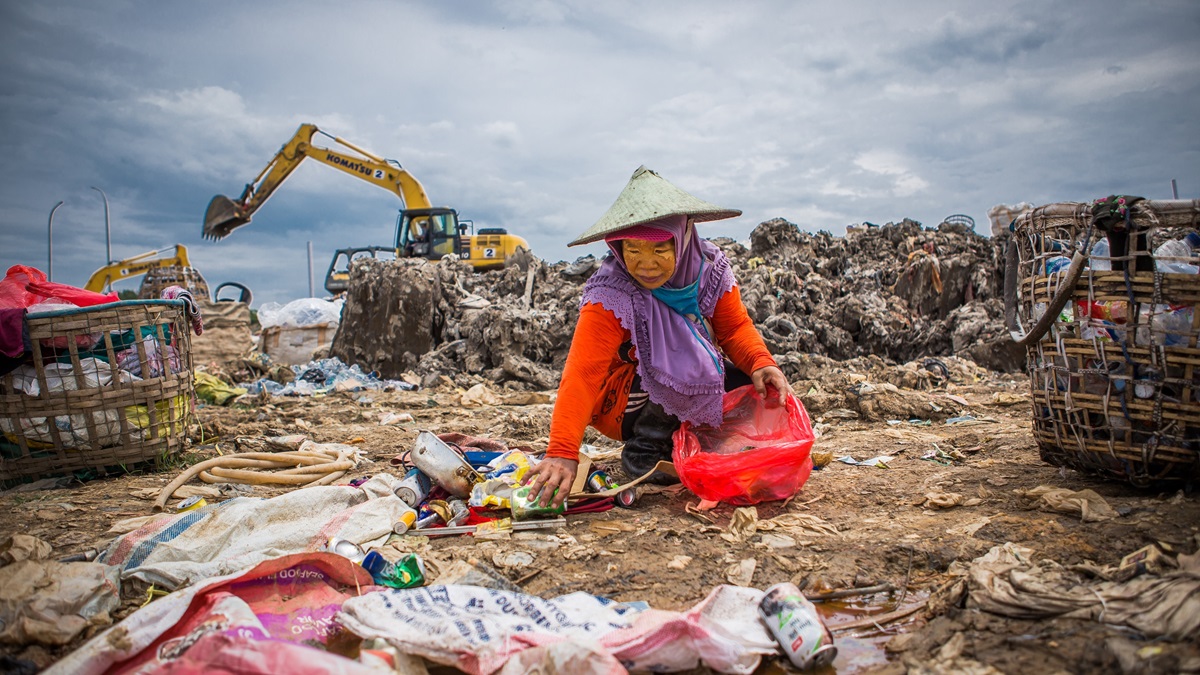The tool helps countries know who is benefiting from economic growth, whether it’s environmentally sustainable and other indicators of progress.

© Shutterstock/hilmanfajar | A woman sorts through waste in Balikpapan, Indonesia.
New UNCTAD data released on 16 November highlights the limitations of Gross Domestic Product (GDP) as an all-encompassing metric for progress, underscoring that higher economic output doesn’t equate to more inclusive and sustainable growth.
Launched in June 2022, the UN trade and development body’s Inclusive Growth Index measures not only traditional economic metrics like GDP but also indicators of living conditions, equality and environmental sustainability.
It was expanded in 2023 to include large economies like China and India and now covers 129 countries representing 93% of the world’s population and 96% of global GDP.
The latest edition shows that while significant disparities remain – developed economies’ average overall score on inclusive growth is nearly double that of developing ones – some gaps are narrowing.
For example, in the environmental category, developed economies score an average of 42.5 out of 100, compared to 31.3 for developing countries – a less stark contrast than in the economic category, where the scores are 41.7 and 14.7, respectively.
The findings echo UN Secretary-General António Guterres’s call to move beyond GDP.
“GDP is a strong measure of economic activity but doesn’t necessarily measure what counts most for people and the planet today and in the future,” says Anu Peltola, who heads UNCTAD’s statistics unit.
“It’s equally important to measure who is benefiting from economic growth, whether it’s improving people’s living conditions and how it affects the environment.
Outliers among developing countries
Developed economies like Luxembourg, Switzerland and Ireland continue to lead the overall index. Singapore and the United Arab Emirates (UAE) are the only developing economies in the top 30.
But a closer examination reveals strong performances by developing economies in different pillars.
Singapore, for instance, scores 90.4 in living conditions, outperforming many developed nations. Similarly, Argentina, Brazil, Chile, China, Costa Rica, Malaysia, Thailand, Türkiye, the UAE and Uruguay all score above 70, closer to the developed country average of 85.3 than the developing country average of 43.8.
In terms of equality, China (78.7), Mexico (77), Argentina (76.8) and Namibia (75.3) match the developed world’s average (77.2), far exceeding the developing world's 45.2.
For the environmental category, developing countries like Singapore (58.6), Panama (48.3) and the Dominican Republic (48) are closing the gap with leading developed countries, such as Denmark (64.8), Ireland (63.6) and the United Kingdom (62.6), showcasing strides in energy efficiency and carbon management.
Variations among developed economies
“If you scratch beneath the surface, the index also reveals many variations among developed economies,” Ms. Peltola says.
The scores range from 100 to 11.6 in the economic category, 100 to 55.8 for living conditions and 100 to 56.3 in terms of equality. But the biggest variation is observed in environmental sustainability, where the scores range from 100 to 4.
Waste management challenges
The index highlights the pressing challenge of breaking the link between economic growth and natural resource use and waste, with developed economies producing about twice as much waste per capita as developing ones.
Luxembourg, for example, a front-runner in the economic pillar, produces an estimated 800 kilograms of waste per person each year, which amounts to over 2 kilograms daily.
On the other end of the spectrum, estimates show that people in Lesotho generate just 37 kilograms per capita each year. In general, least developed countries and small island developing states have the lowest per capita rates of waste.
Although higher economic output and denser populations generally create more waste, countries like Japan and South Korea show that effective management is possible.
A vital tool for future policies
As the world grapples with pressing challenges related to climate change and widening socioeconomic disparities, the index provides essential data for policymakers to pinpoint areas for improvement and craft more effective solutions.
The need for a more comprehensive approach to assessing development is expected to be a key topic at the 2024 Summit of the Future.



